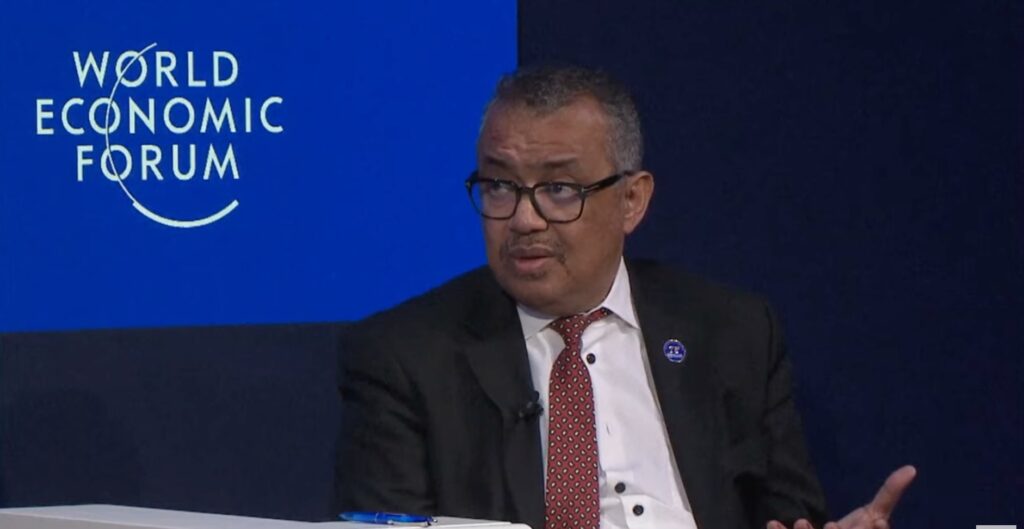Don’t trust Davos on ‘Disease X’
The WEF risks repeating Covid-era mistakes in future pandemics.


Today’s panel discussion on “Disease X” — an unknown and hypothetical future pandemic — at the 54th annual meeting of the World Economic Forum didn’t make for easy viewing. It revealed worrying signs of the acceleration of technocratic tendencies in pandemic preparedness, which have only consolidated since Covid.
The panel began with a statement by Dr. Tedros Adhanom Ghebreyesus, Director General of the World Health Organization, which ironically attempted to clarify “misinformation” about the panel itself, believed to be the number one global threat by the WEF’s Global Risks Report 2024. As Tedros stated, we should not be worried about the mysterious term Disease X, which is simply a placeholder to help plan for future biological threats.
Before the panel this week, social media fears abounded that Disease X would be used as an excuse to reintroduce more lockdowns and vaccine mandates. Yet despite Tedros going on to advocate, rightly, for strengthening primacy healthcare, education and supporting communities to help prepare for Disease X, he did not address these fears, nor the reasons why people might be distrustful of the panelists.
This year’s Davos theme centred on rebuilding trust, but the pandemic panel failed to mention the mistakes made during the Covid period. Curiously, the only reference to lockdown was made in passing by Preetha Reddy, a health executive from India, who recommended that the pandemic response could learn more from the army. “At any time, anything can happen and we don’t know what side it can come from,” she stated.
Unfortunately, the focus on Disease X is indicative of a broader phenomenon: the rise of our new biomedical security state, best represented by the technocratic governance structures that drove emergency laws on lockdowns, mask and vaccine mandates, quarantines, school closures and censorship.
This is interwoven into the semantic origins of Disease X, which was christened in the WHO R&D Blueprint in 2017 to assist prioritising research and development particularly for vaccines, treatments and tests. It has since become a core driving force for the proliferation of public-private partnerships (PPP) in the global pandemic preparedness industry.
The Coalition for Epidemic Preparedness Innovations, a PPP established by the Gates Foundation, has mobilised the world under its new slogan: ensuring that a novel pandemic can have a novel vaccine developed in 100 days. This vision was first articulated by CEPI at Davos in 2017, and then adopted by the G7 in 2021 on the heels of the plug and play characteristics of the Covid mRNA vaccines.
Today’s panel reflected the ascendency of this global movement. For instance, Michel Demaré, Chair of the Board of AstraZeneca, emphasised the need to accelerate quick action for R&D, artificial intelligence and a “health industrial complex” in the preparation for any future pandemic.
This techno-utopian vision has come to dominate the pandemic preparedness agenda. A state-of-the-art vaccine development centre was recently created by the UKHSA in the UK. And the US Congress is likely to soon pass a new Disease X Act of 2023, based on promoting public-private partnerships for medical countermeasures.
So while the term Disease X represents a future unknown health emergency, it has also become a catalyst for a particular vision of health response dominated by corporate, technological and state power.
With a Frankensteinian twist, efforts to prevent Disease X may, in fact, create it. Covid, of course, might have emerged from gain-of-function research at the Wuhan Institute of Virology. But a recent analysis showed that the problem of lab biosafety is a ubiquitous and growing one, influenced by an insatiable desire for genetic engineering. Last week, for example, a pre-print from Chinese scientists raised alarm bells about further gain-of-function research on a mutant Covid strain using humanised mice. The US Disease X Act itself has been driven in part by growing recognition of this threat in the intelligence community.
But nothing about these developments was mentioned at Davos. Elites prefer to turn a blind eye — which is exactly why so few people now trust them.
Follow Kevin Bardosh on X (formerly Twitter) @KevinBardosh
